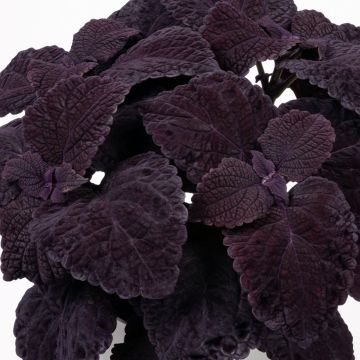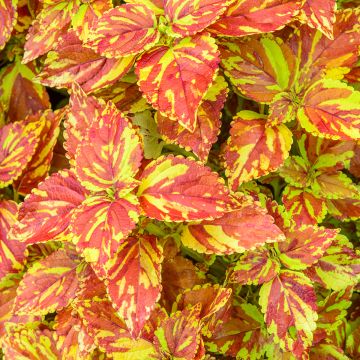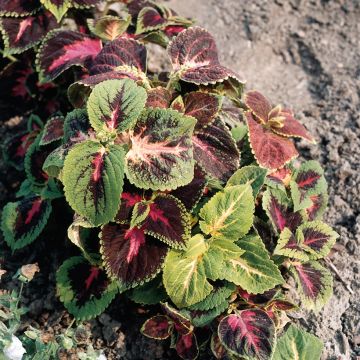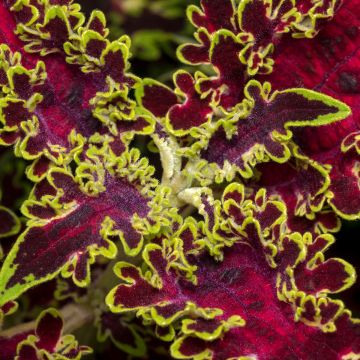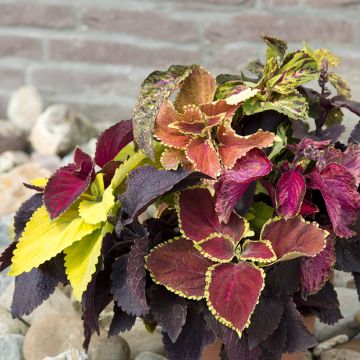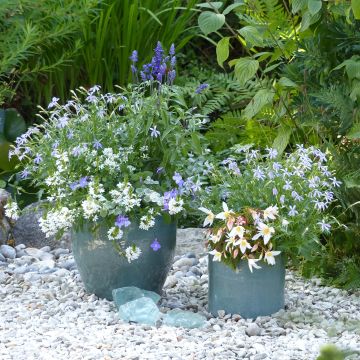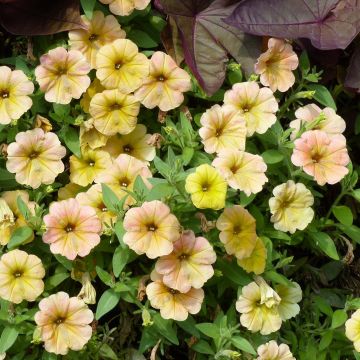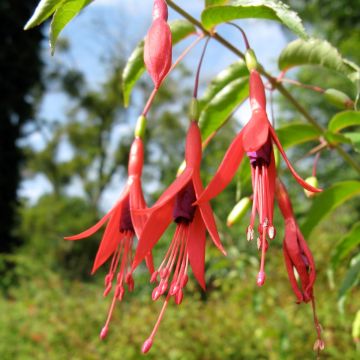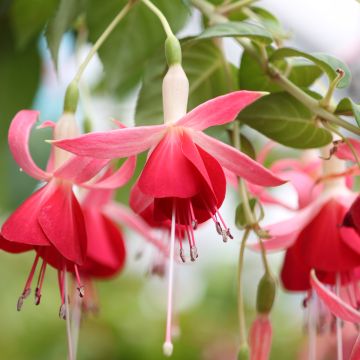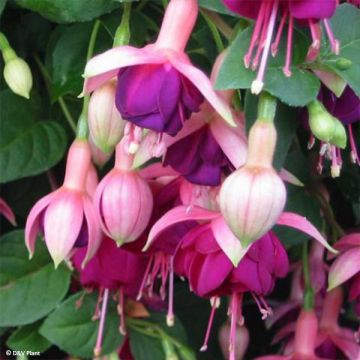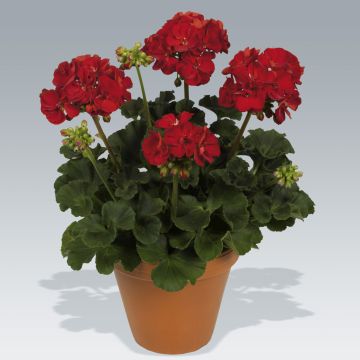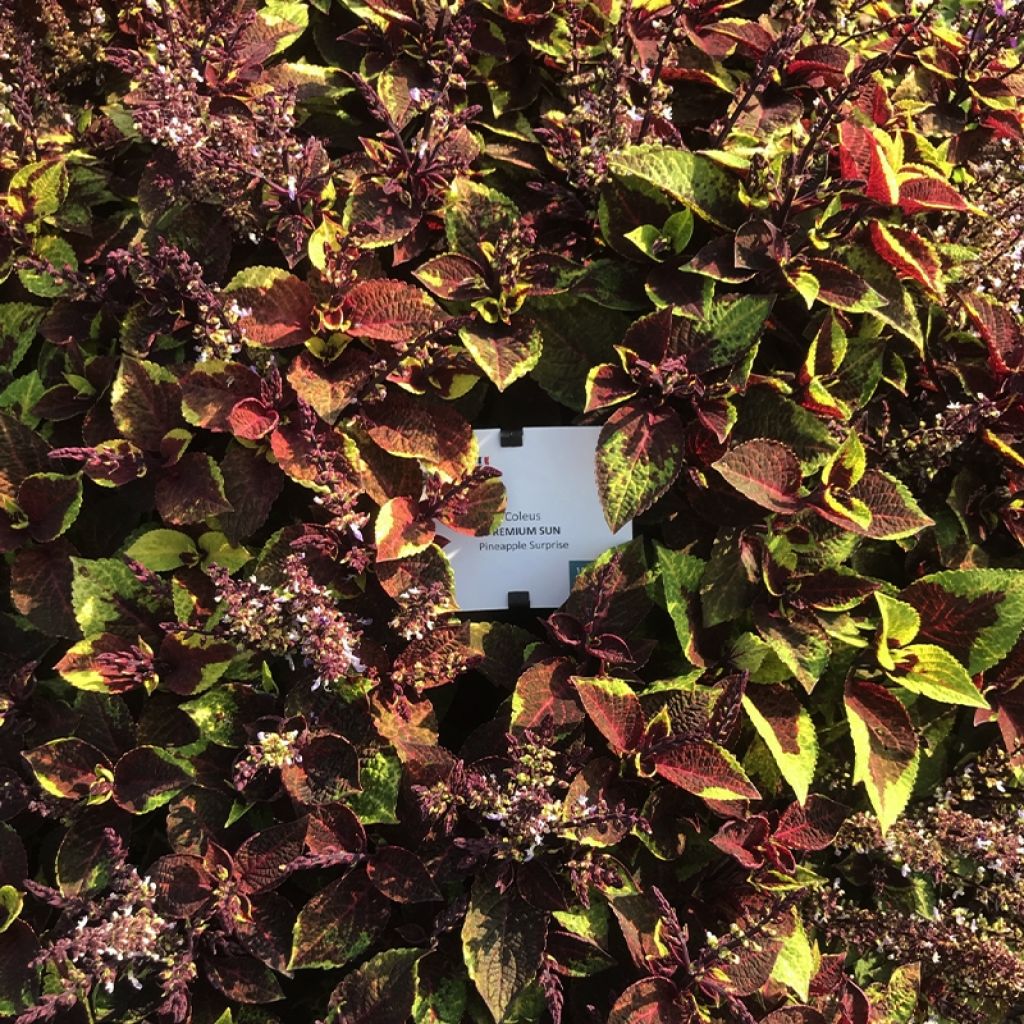

Coleus Pineapple Surprise
Solenostemon Pineapple Surprise
Solenostemon scutellarioides Pineapple Surprise
Coleus, Painted Nettle
This item cannot be shipped to the selected country
Delivery charge from €5.90
More information
Schedule delivery date,
and select date in basket
This plant carries a 6 months recovery warranty
More information
We guarantee the quality of our plants for a full growing cycle, and will replace at our expense any plant that fails to recover under normal climatic and planting conditions.
From €5.90 for pickup delivery and €6.90 for home delivery
Express home delivery from €8.90.
Does this plant fit my garden?
Set up your Plantfit profile →
Description
The Coleus Pineapple Surprise is a variety of Solenostemon whose design suits contemporary decor perfectly. The plant forms a beautiful dense clump and is adorned with unique foliage with a tricolour pattern, chartreuse green with a dark Bordeaux heart, splashed with chartreuse and green. It rarely flowers and requires little maintenance, planted in semi-shade in moist soil. Gel-sensitive, Coleus plants are cultivated as indoor plants or in gardens as annuals to decorate balconies and terraces. They are also particularly decorative in seasonal compositions.
Coléus, also known as Solenostemon or Plectranthus, are plants related to Basil. They belong to the mint family, as evidenced by their small bilabiate flowers with elongated lower lip, their fleshy square-sectioned stems, and their toothed and hairy leaves on the underside. This genus comprises around sixty species of tender shrubby perennials, native to Asia and tropical Africa. Horticulture has produced numerous hybrids and cultivars, including many descendants of Solenostemon scutellarioides.
The Coléus 'Pineapple Surprise' forms well-branched clumps, reaching about 55 cm (22in) in all directions in one season. The leaves are heart-shaped, with toothed edges and slightly hairy. The center and base of the laminae have a red-brown macule in the shape of a heart, while the rest of the leaf is marbled and speckled with green on a chartreuse background. The flowering, which is late and sporadic in this selection, is discreet. It sometimes occurs at the end of the season, in the form of small pale mauve-blue flowers. It is often recommended to remove these flowers so that the plants do not exhaust themselves producing seeds and maintain generous foliage.
The coleus, sometimes called 'painted nettle' because of their incredibly diverse foliage, are irreplaceable for adding a beautiful exotic touch to any decor in the garden as well as in the house, where they can live for several years. They prefer a semi-shaded exposure, which can be found at the edge of a bed of tall perennials or shrubs, or in a cool rockery, facing north or east, away from the burning rays of the sun. They can be used to create small mosaic-like beds of colours and pair well with begonias in flower pots. The richness of their colours makes them somewhat difficult to pair with other plants; small ferns like Polypodium or purple misère (Tradescantia pallida) will be good companions for Coleus Pineapple Surprise. They also go particularly well with begonias in flower pots.
Note: Please note that our young plug plants are professional products intended for experienced gardeners; upon receipt, transplant and store them under shelter (veranda, greenhouse, cold frame) at a temperature above 14C° for a few weeks before being installed outdoors once the risk of frost is definitively eliminated.
Report an error about the product description
Solenostemon Pineapple Surprise in pictures
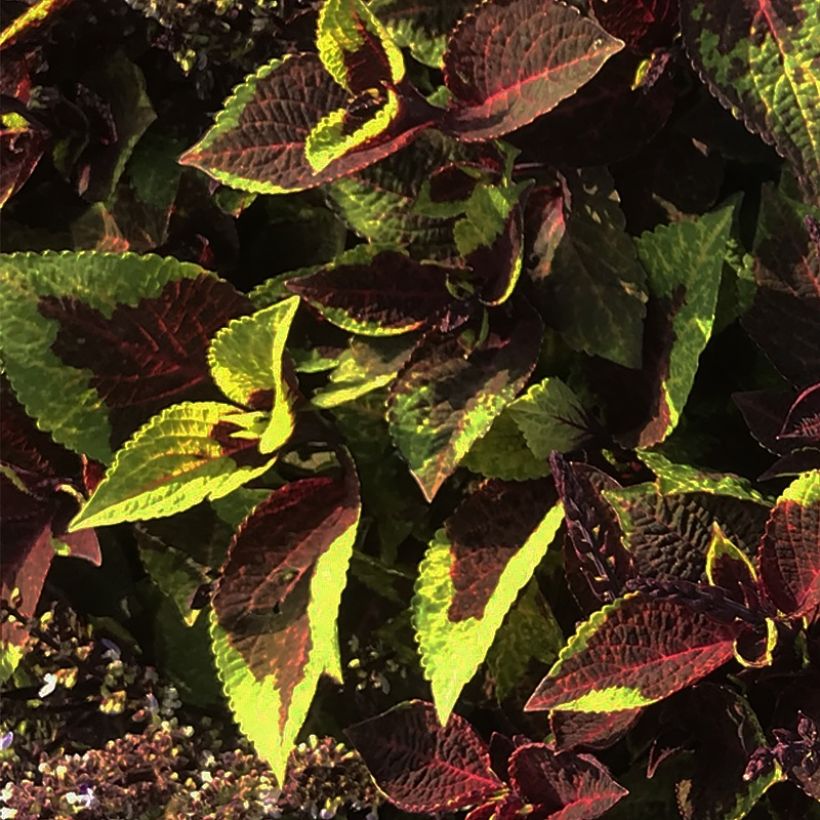

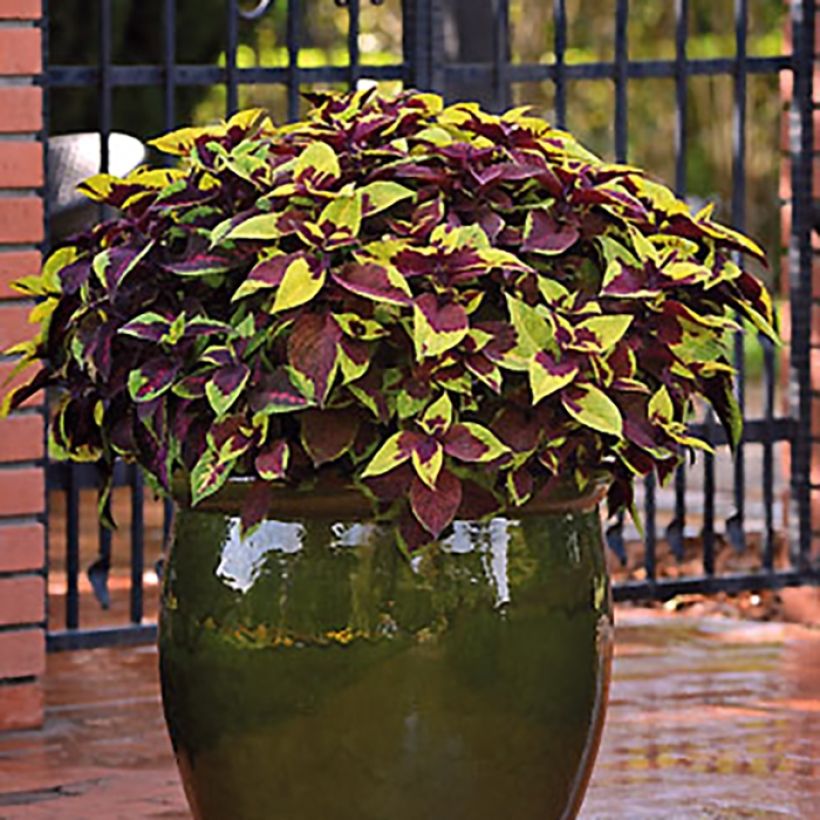

Flowering
Foliage
Plant habit
Botanical data
Solenostemon
scutellarioides
Pineapple Surprise
Lamiaceae
Coleus, Painted Nettle
Cultivar or hybrid
Other Coleus
Planting and care
The Pineapple Surprise Coleus plants are easy to grow. Plant them after the last frost, preferably in a partially shaded or possibly shaded but bright and sheltered from the wind location. Morning sun is well tolerated, but hot exposures should be avoided. They need a light and humus-rich soil, but well-drained and appreciate a fertilizer input. They are not demanding on the nature of the soil and tolerate limestone well. You can plant your coleus in pots, where they will need to be watered regularly. Apply a little liquid fertilizer every fifteen days from June to September. Remove the flowers as soon as they appear to extend the life of the plant. Usually grown as annuals, they are actually delicate perennials: by bringing them indoors at the first frost, you can extend their life for a few years. Outdoor cultivation is possible by the seaside, with good winter mulching. Plan for light pruning in March.
Planting period
Intended location
Care
This item has not been reviewed yet - be the first to leave a review about it.
Plug plants - Annuals
Haven't found what you were looking for?
Hardiness is the lowest winter temperature a plant can endure without suffering serious damage or even dying. However, hardiness is affected by location (a sheltered area, such as a patio), protection (winter cover) and soil type (hardiness is improved by well-drained soil).

Photo Sharing Terms & Conditions
In order to encourage gardeners to interact and share their experiences, Promesse de fleurs offers various media enabling content to be uploaded onto its Site - in particular via the ‘Photo sharing’ module.
The User agrees to refrain from:
- Posting any content that is illegal, prejudicial, insulting, racist, inciteful to hatred, revisionist, contrary to public decency, that infringes on privacy or on the privacy rights of third parties, in particular the publicity rights of persons and goods, intellectual property rights, or the right to privacy.
- Submitting content on behalf of a third party;
- Impersonate the identity of a third party and/or publish any personal information about a third party;
In general, the User undertakes to refrain from any unethical behaviour.
All Content (in particular text, comments, files, images, photos, videos, creative works, etc.), which may be subject to property or intellectual property rights, image or other private rights, shall remain the property of the User, subject to the limited rights granted by the terms of the licence granted by Promesse de fleurs as stated below. Users are at liberty to publish or not to publish such Content on the Site, notably via the ‘Photo Sharing’ facility, and accept that this Content shall be made public and freely accessible, notably on the Internet.
Users further acknowledge, undertake to have ,and guarantee that they hold all necessary rights and permissions to publish such material on the Site, in particular with regard to the legislation in force pertaining to any privacy, property, intellectual property, image, or contractual rights, or rights of any other nature. By publishing such Content on the Site, Users acknowledge accepting full liability as publishers of the Content within the meaning of the law, and grant Promesse de fleurs, free of charge, an inclusive, worldwide licence for the said Content for the entire duration of its publication, including all reproduction, representation, up/downloading, displaying, performing, transmission, and storage rights.
Users also grant permission for their name to be linked to the Content and accept that this link may not always be made available.
By engaging in posting material, Users consent to their Content becoming automatically accessible on the Internet, in particular on other sites and/or blogs and/or web pages of the Promesse de fleurs site, including in particular social pages and the Promesse de fleurs catalogue.
Users may secure the removal of entrusted content free of charge by issuing a simple request via our contact form.
The flowering period indicated on our website applies to countries and regions located in USDA zone 8 (France, the United Kingdom, Ireland, the Netherlands, etc.)
It will vary according to where you live:
- In zones 9 to 10 (Italy, Spain, Greece, etc.), flowering will occur about 2 to 4 weeks earlier.
- In zones 6 to 7 (Germany, Poland, Slovenia, and lower mountainous regions), flowering will be delayed by 2 to 3 weeks.
- In zone 5 (Central Europe, Scandinavia), blooming will be delayed by 3 to 5 weeks.
In temperate climates, pruning of spring-flowering shrubs (forsythia, spireas, etc.) should be done just after flowering.
Pruning of summer-flowering shrubs (Indian Lilac, Perovskia, etc.) can be done in winter or spring.
In cold regions as well as with frost-sensitive plants, avoid pruning too early when severe frosts may still occur.
The planting period indicated on our website applies to countries and regions located in USDA zone 8 (France, United Kingdom, Ireland, Netherlands).
It will vary according to where you live:
- In Mediterranean zones (Marseille, Madrid, Milan, etc.), autumn and winter are the best planting periods.
- In continental zones (Strasbourg, Munich, Vienna, etc.), delay planting by 2 to 3 weeks in spring and bring it forward by 2 to 4 weeks in autumn.
- In mountainous regions (the Alps, Pyrenees, Carpathians, etc.), it is best to plant in late spring (May-June) or late summer (August-September).
The harvesting period indicated on our website applies to countries and regions in USDA zone 8 (France, England, Ireland, the Netherlands).
In colder areas (Scandinavia, Poland, Austria...) fruit and vegetable harvests are likely to be delayed by 3-4 weeks.
In warmer areas (Italy, Spain, Greece, etc.), harvesting will probably take place earlier, depending on weather conditions.
The sowing periods indicated on our website apply to countries and regions within USDA Zone 8 (France, UK, Ireland, Netherlands).
In colder areas (Scandinavia, Poland, Austria...), delay any outdoor sowing by 3-4 weeks, or sow under glass.
In warmer climes (Italy, Spain, Greece, etc.), bring outdoor sowing forward by a few weeks.

































